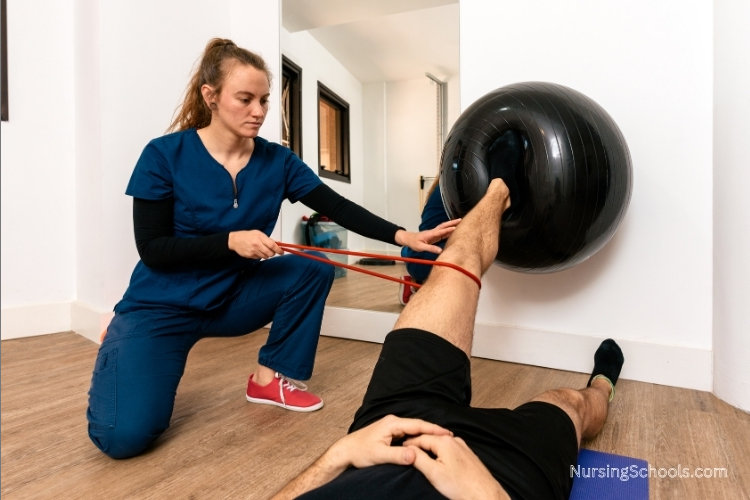Rehabilitation Nurse
Nursing Career Guide

Recovery after injury, illness, or surgery can be a long road, and Rehabilitation Nurses are there to guide patients every step of the way. These nurses specialize in helping individuals regain strength, mobility, and independence - often working with patients who have experienced strokes, spinal cord injuries, or chronic conditions. They collaborate closely with physical therapists, occupational therapists, and physicians in rehab hospitals, long-term care centers, and outpatient clinics. Let's delve into the Rehabilitation Nurse career and explore what it takes to thrive in this restorative nursing specialty.
Overview
What Is a Rehabilitation Nurse?
A Rehabilitation Nurse specializes in helping patients recover from injuries, surgeries, or chronic illnesses that affect mobility and daily function. These nurses provide physical and emotional support to individuals with conditions such as stroke, spinal cord injuries, amputations, and neurological disorders.
Rehabilitation Nurses work in hospitals, inpatient rehabilitation centers, outpatient therapy clinics, and long-term care facilities. They collaborate with physical therapists, occupational therapists, and physicians to develop individualized care plans that promote patient independence and recovery.
This career requires strong patient advocacy skills, knowledge of rehabilitation techniques, and the ability to encourage and motivate patients throughout the recovery process.
Education
How To Become a Rehabilitation Nurse
Becoming a Rehabilitation Nurse requires a combination of traditional nursing education, clinical experience, certification, and specialized training in physical recovery and chronic care management. Follow these steps to enter this challenging and rewarding healthcare career:
- Earn a Nursing Degree. Complete an Associate of Science in Nursing (ASN) or Bachelor of Science in Nursing (BSN). A BSN is preferred for advanced rehabilitation nursing roles.
- Pass the NCLEX-RN. Obtain your nursing license by passing the National Council Licensure Examination for Registered Nurses (NCLEX-RN).
- Gain Clinical Experience. Work as a Registered Nurse (RN) in rehabilitation units, long-term care facilities, or physical therapy centers.
- Obtain Rehabilitation Nursing Certification. Earn the Certified Rehabilitation Registered Nurse (CRRN) credential through the Association of Rehabilitation Nurses (ARN) to demonstrate expertise in rehabilitation nursing.
- Continue Professional Development. Stay updated with advancements in mobility recovery, adaptive technology, and chronic disease management through continuing education courses.
On average, it takes 4-6 years to become a Rehabilitation Nurse, including nursing school, licensure, and obtaining specialized training. Certification enhances job opportunities and credibility in this field.

Average Salary
How Much Does a Rehabilitation Nurse Make?
Salaries for Rehabilitation Nurses vary based on experience, location, and work setting. On average, a Rehabilitation Nurse can expect to earn between $75,000 and $105,000 annually.
Average annual salary for a Rehabilitation Nurse:
- Entry-level: $75,000 - $85,000 per year.
- Mid-career: $85,000 - $95,000 per year.
- Experienced: $95,000 - $105,000 per year.
The U.S. Department of Labor reports that Rehabilitation Nurses earn an average hourly wage of approximately $38.00 per hour. Assuming a 40-hour workweek, this equates to an annual salary of $79,040. The lowest 10% earn less than $34.00 per hour, while the highest 10% earn more than $48.00 per hour, resulting in an annual salary range of $70,720 to $99,840 per year.
Job Duties
What Does a Rehabilitation Nurse Do?
Rehabilitation Nurses provide specialized care that focuses on patient recovery, mobility, and independence. Their role includes assessing patient needs, assisting with therapy exercises, and educating families on long-term care.
The most common job duties of a Rehabilitation Nurse:
- Assessing Patient Needs. Evaluate mobility, strength, and cognitive function to create a rehabilitation plan.
- Assisting with Physical Therapy. Help patients with mobility exercises, gait training, and use of adaptive equipment.
- Providing Wound Care. Monitor and treat pressure ulcers, surgical wounds, and skin conditions.
- Managing Chronic Conditions. Assist patients with diabetes, stroke recovery, and spinal cord injury management.
- Educating Patients and Families. Teach self-care techniques, fall prevention, and assistive device usage.
- Administering Medications. Provide pain management and muscle relaxants as part of a rehabilitation plan.
- Preventing Complications. Monitor for blood clots, infections, and other post-surgical risks.
- Advanced Duties. Experienced Rehabilitation Nurses may work in case management, home health rehabilitation, or research in physical recovery techniques.
Rehabilitation Nurses typically work in hospitals, rehabilitation centers, long-term care facilities, and home healthcare settings. Their role is crucial in helping patients regain independence and improve their quality of life.

Essential Skills
What Skills Does a Rehabilitation Nurse Need?
Rehabilitation Nurses require a blend of physical therapy knowledge, patient advocacy skills, and motivational techniques to assist patients through recovery. These skills help ensure that patients can regain function and lead fulfilling lives.
Here are some of the skills a Rehabilitation Nurse needs to succeed:
- Physical Rehabilitation Knowledge. Understand therapeutic exercises, mobility techniques, and adaptive equipment use.
- Patient Advocacy. Support patients in setting recovery goals and overcoming physical challenges.
- Pain Management. Administer medications and recommend non-pharmacological pain relief techniques.
- Wound Care Expertise. Monitor and treat pressure sores, incisions, and chronic wounds.
- Critical Thinking. Adjust rehabilitation plans based on patient progress and needs.
- Communication. Educate patients and caregivers about ongoing rehabilitation requirements.
- Collaboration. Work with physical therapists, occupational therapists, and speech therapists for comprehensive care.
- Emotional Support. Provide motivation and encouragement to patients during their rehabilitation journey.
One of the biggest challenges of being a Rehabilitation Nurse is helping patients cope with long-term disabilities or slow progress in recovery. However, the role is highly rewarding, as it allows nurses to empower patients to regain independence and lead more active lives.
Last updated: August 29, 2025
References:
- Registered Nurses. Bureau of Labor Statistics, U.S. Department of Labor. Occupational Outlook Handbook. Retrieved August 29, 2025.
- NCLEX Nurse Licensure Exam. National Council of State Boards of Nursing (NCSBN). Retrieved August 29, 2025.
- Rehabilitation Nurse. Johnson & Johnson, Nursing Careers. Retrieved August 29, 2025.
- Rehabilitation Nurse Salary in the United States. ZipRecruiter, Healthcare Career Path. Retrieved August 29, 2025.
- Become a Certified Rehabilitation Registered Nurse (CRRN). Association of Rehabilitation Nurses (ARN), Nursing Certification. Retrieved August 29, 2025.
- Nursing Specialty Certifications. American Nurses Association (ANA). Retrieved August 29, 2025.
- What does a rehab nurse do. Indeed, Healthcare Career Guide. Retrieved August 29, 2025.
- Rehabilitation Professionals Member Organization. The National Rehabilitation Association (NRA). Retrieved August 29, 2025.
- What is a rehabilitation nurse. The Johns Hopkins University, Healthcare. Retrieved August 29, 2025.
- Role of Nursing in Rehabilitation. Journal of Rehabilitation Medicine - Clinical Communications. Retrieved August 29, 2025.
- In-home rehabilitation nursing. MedStar Health, Healthcare Services. Retrieved August 29, 2025.
- A Glimpse into What it's Like to be a Rehabilitation Nurse. Encompass Health, Healthcare Services. Retrieved August 29, 2025.


